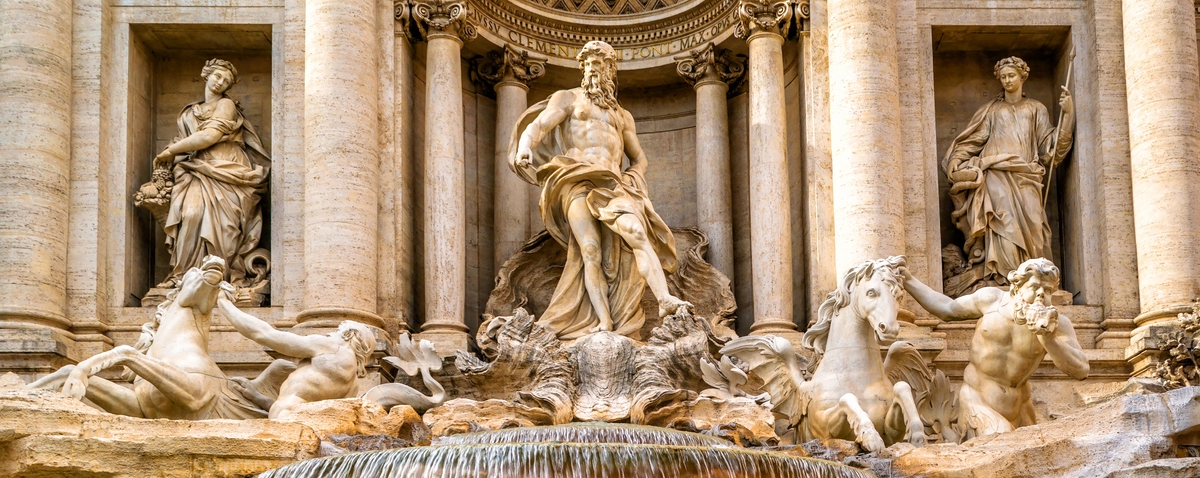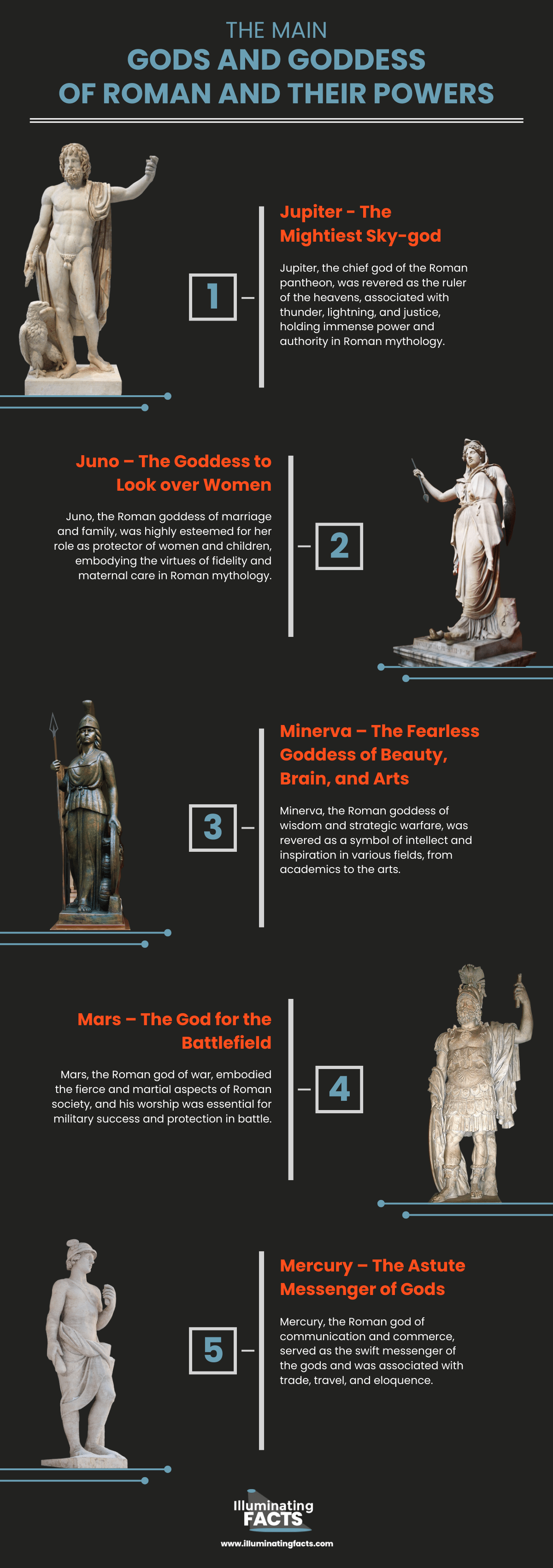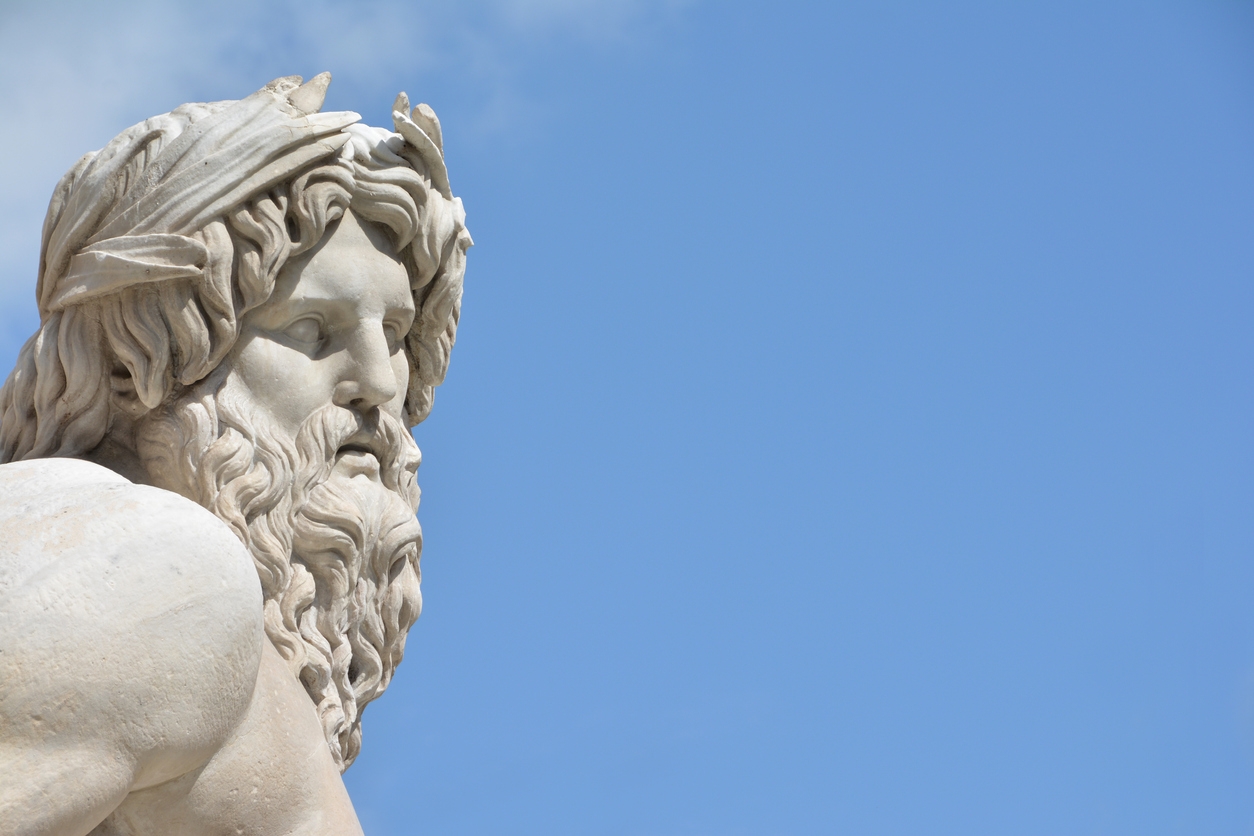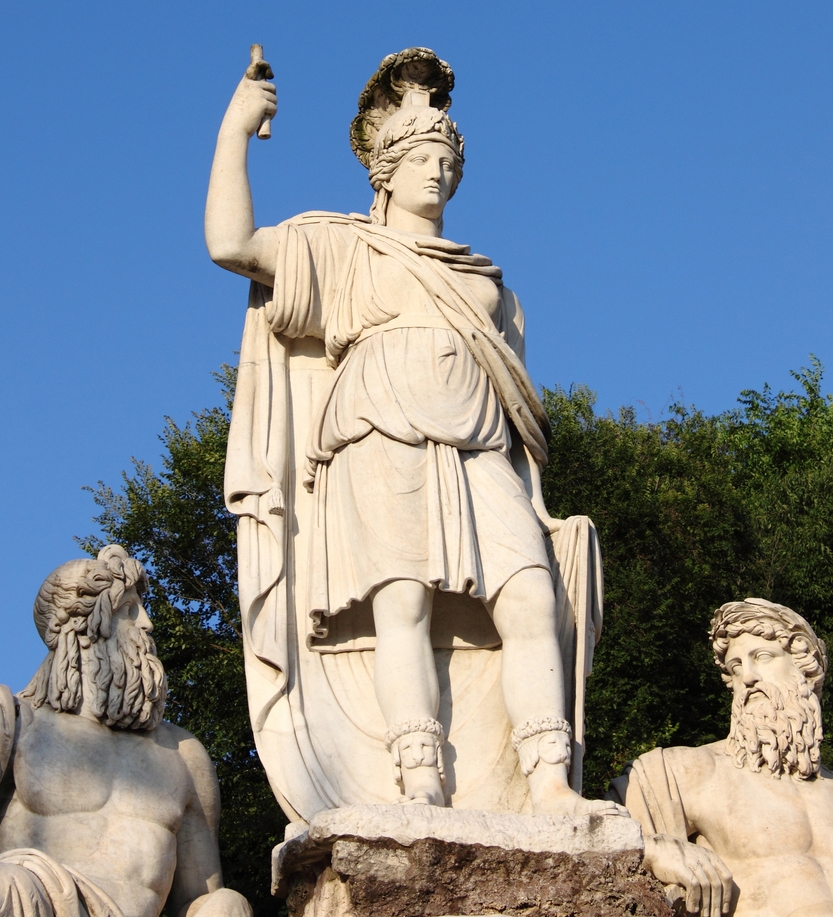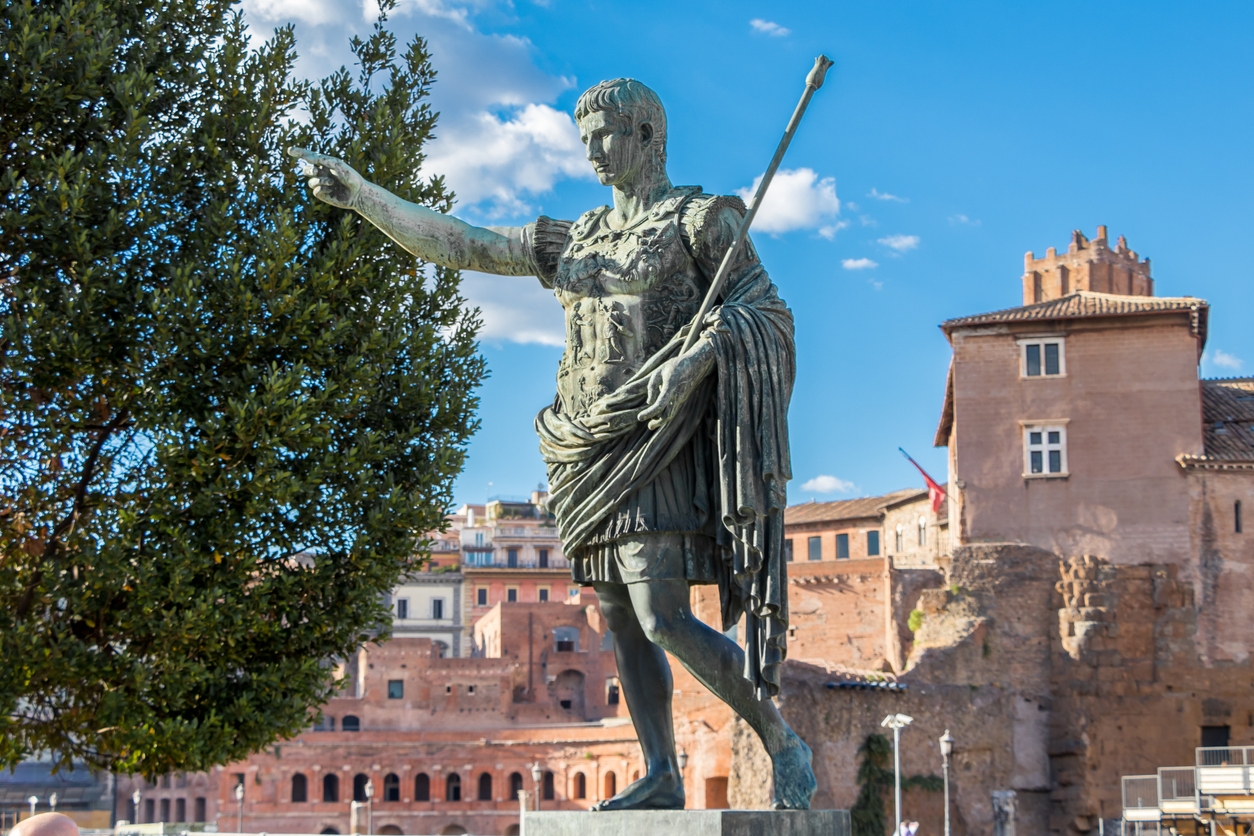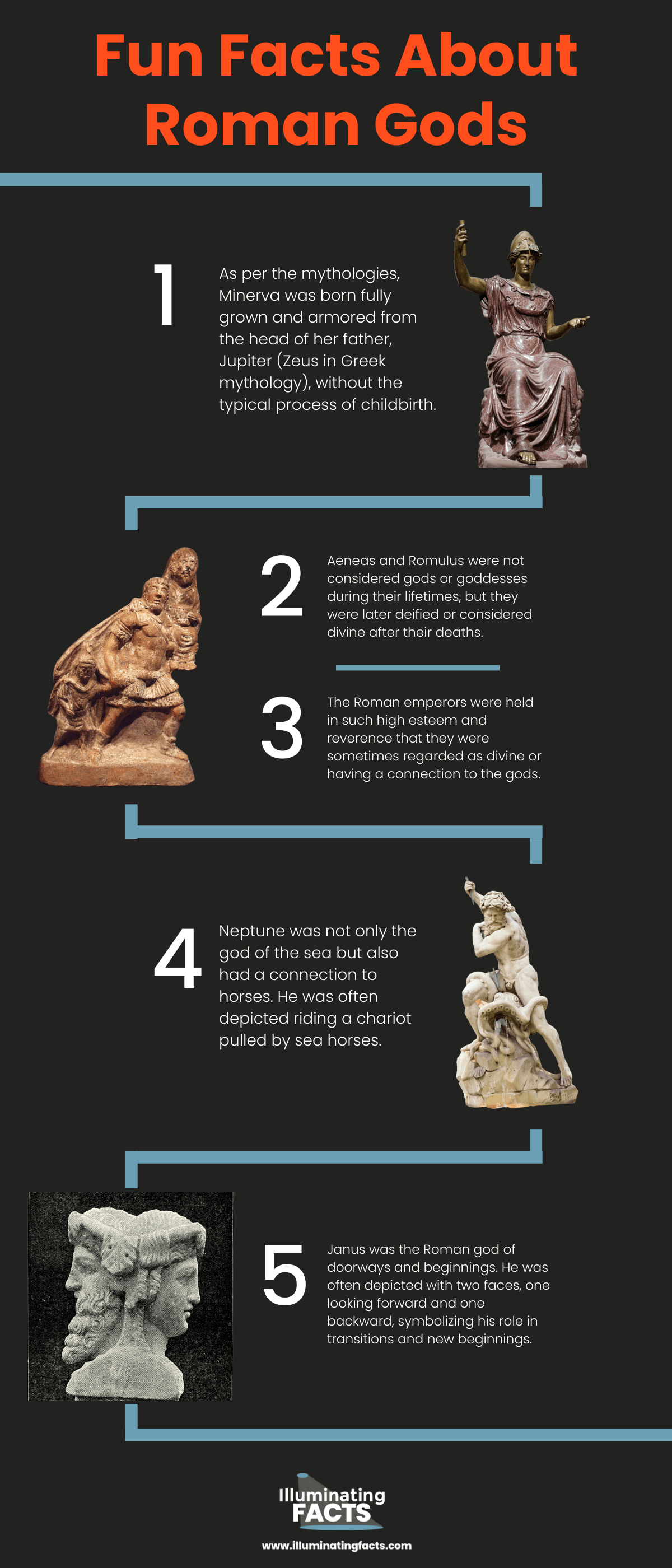The ancient Roman civilization was under the rule of Roman gods and goddesses for many years. Among them, Jupiter, with his strength and magnificence, held the power to bring calamities upon the world. On the other hand, Venus, the goddess of beauty, fertility, and victory, possessed a gentle yet captivating charm that could mesmerize anyone. These divine figures played a central role in shaping the culture and beliefs of ancient Rome.
Roman society relied on their gods and goddesses for every aspect of their lives. Being majorly the polytheists, Romans had different gods for every task. [1] While the number of gods and goddesses is long and it is difficult to understand who are the main Roman gods, most scholars believe Juno, Jupiter, and Minerva are the most superior for the powers they hold over all the major tasks of life.
Romans and Their Devotion to Their Gods and Goddesses:
Gods and goddesses of Romans were not just some deities to be worshiped, Romans believed that they were the only sources of power and wisdom, and pleasing them could help maintain a powerful life full of happiness and strength. In fact, the Romans staunchly believed that Rome did not happen overnight, the civilization existed because the deities wanted it to live and conquer. The Roman gods were not solely limited to power and war but the daily lives of the people were equally influenced by them. The gods and goddesses were religiously celebrated, their rituals unique and decorative whereby Romans would adorn their grand buildings with decorations.
The Power Game of Roman Gods and Their Influence from Greek Deities:
Anyone who is a fan of Greek mythologies knows that a lot of what is known of the Roman gods and goddesses has its influence from the Greek traditions and norms. In fact, many Roman gods and goddesses had similar attributes to Greek ones, but some were their more powerful versions. The reason for such a strong influence of Greek gods and goddesses over the Romans and their religious cultures was the location of Rome with respect to Greece. The Romans would often visit Greece for economic purposes; Greece had its land spread across Sicily and the Italian peninsula. These interactions between Greeks and Romans resulted in cultural exchange and civilizations getting influenced by each other.
The Main Gods and Goddess and their Powers:
The Romans really liked winning and growing their territory. They didn’t see wars and taking over new lands as bad things; instead, they thought of them as something to feel happy about and proud of. This desire to compete and always be power-hungry was also seen in the deities they worshiped. This desire to compete and always be power-hungry was also seen in the deities they worshipped. From vengeful Furies who were all about taking revenge to the Vulcan who had the power to burst open the earth and cause volcanic havoc, the gods and goddesses in Roman civilization exude authority and autonomy. While the ancient Roman gods and goddesses were worshipped as per the task at hand as each event had a different god/goddess, the 5 most powerful and widely feared gods/goddesses were Jupiter, Juno, Minerva, Mars, and Mercury.
Jupiter – The Mightiest Sky-God:
Jupiter, the god who was worshipped by everyone in Roman civilization for its power over all the matters related to life, had a lot of traits of the Greek god Zeus. Commanding from the sky with the thunderbolt in his one hand, Jupiter could quickly instill fear among the people. Not only did his persona radiate authority, but he was also the most dominant of all the gods. The protector of Rome, as was believed by his worshippers, Romans used to revere him at the time of the wars. Every time they would win the war, the commanders would visit Jupiter’s temple in respect and worship him for granting them victory.
This king of all gods was a brother to Pluto and Neptune and Romans believed that all the natural phenomena were in his power. When angry over the Romans, he exhibited his anger through catastrophes and thunderbolts, warning people to mend their ways according to his commands.
Juno – The Goddess to Look over Women:
In Greek mythologies, Juno is Hera. Juno, the Roman goddess of marriage and family, was a formidable and regal figure in Roman mythology. She was the wife of Jupiter, the king of the gods, and was revered as the protector of women, particularly in matters of matrimony and childbirth. Juno’s watchful and nurturing presence extended throughout Roman society, emphasizing the importance of fidelity and the sanctity of the family unit. [2]
Minerva – The Fearless Goddess of Beauty, Brain, and Arts:
Though Minerva is known for being the goddess of war, Romans would pay their homage to her in all matters related to craftsmanship or intelligence. Whether a person wanted to hone a skill or had the desire to work on his/her wisdom, Minerva would always be sought to aid and guide in the process. Besides her authority over war and wisdom, she was also worshiped for her influence in realms related to business, economics, and scholarly endeavors.
In Roman mythology, Minerva (Athena in Greek mythology) was believed to have sprung fully grown and armored from the head of Jupiter. As she was associated with wisdom and skills, making her a patron of education and craftsmanship. People seeking guidance in acquiring knowledge or honing their skills might have looked to Minerva for assistance.
Mars – The God for the Battlefield:
Mars was one of the most prominent gods worshiped in Rome. While the war was one reason for his popularity, he was also the father of Romulus and Remus. According to Roman mythology, it was Romulus who created Rome and so the name was chosen after him. [3]
Mercury – The Astute Messenger of Gods:
Although Mercury had power over good fortune, economy, and wealth, it was the fact that he was the most trusted and wisest of all gods that made him class apart from the rest. According to Roman mythologies, he was the most trusted and so would assist all the gods by being their messenger. The power to interpret other gods and their messages was in his hands. [4]
The Pax Deorum and Its Influence on Wars
The relationship of Roman civilization with their gods/goddesses defined their victories and invasions. Their unquenching thirst for power and fortune also had a deep connection with the evolution of their deities. The embedment of complex rituals as part of their normal day-to-day life showcases how significant gods/goddesses were to them. In order to create a healthy bond with gods/goddesses, the Pax Deorum was necessary. The act of keeping peace with gods was called Pax Deorum in Rome.
Decius and His Reliance of Gods for Victory
One of the most prominent events that highlight the reliance of Romans on their gods and showcase how necessary Pax Deorum was for them, occurred during the war between Romans and the Latins around 340 BCE. As per one of the historians, the Romans were in shambles and desperately needed quick assistance from their gods. It is for this reason, Decius, the general of the war, requested the priest to guide him and share with him the worship that could make the Romans victorious.
Relying on the priest’s instructions (Pontifex Maximus), Decius valiantly came forward with all his might overwhelming the enemies as suddenly Decius became “superhuman”.[5] Though he did not survive, he managed to bring victory to the Romans. This event alone is a prime example of the need of Romans to follow the gods in order to keep peace with them.
The Power Politics and Pontifex Maximus:
With imperials being so much respected and considered as being directly linked to divinity, many aristocrats saw this as an opportunity to gain power over the people. Augustus was one such individual who came victorious after a civil war. Though an emperor, he was aware that he could be dethroned by other equivalently power-hungry individuals so he decided to illustrate himself as someone with maximum piety and directly connected to the divine deities. Being from the family of Julius Caeser who earned the status of a god, Augustus knew he had the potential to become a god and enjoy the hegemony over the people. Though he became the Pontifex Maximus while alive, his wish to be elevated to the rank of god was granted after his death. [6]
Fun Facts about The Roman Gods:
Unlike many religions, the Romans did not assess good or bad people from their deeds but would rather judge them through their prestige in society, the abundance of wealth they acquired, or the dominance or influence they could exhibit due to their power. For the romans power, wisdom and wealth defined your status in the eyes of the gods/goddesses. The power-hungry Roman civilization staunchly believed in pleasing their gods/goddesses to enjoy the bounties from gods/goddesses, as displeasing them meant being at war with them and inviting their anger that could create pandemonium. There are some interesting facts related to Roman gods/goddesses that now seem amusing but for Romans, they were powerful enough to inculcate fear.
1- As per the mythologies, Minerva was born fully grown and armored from the head of her father, Jupiter (Zeus in Greek mythology), without the typical process of childbirth.
2- Aeneas and Romulus were not considered gods or goddesses during their lifetimes, but they were later deified or considered divine after their deaths.
3-The Roman emperors were held in such high esteem and reverence that they were sometimes regarded as divine or having a connection to the gods. [7]
4- Neptune was considered the moodiest god, people were afraid of his moods, and those living nearby the sea would always worship him to avoid his many moods. [8]
5-Janus was the Roman god of doorways and beginnings. He was often depicted with two faces, one looking forward and one backward, symbolizing his role in transitions and new beginnings. [9]
Conclusion:
The reliance of Romans on gods and goddesses for their everyday tasks and for more significant purposes can be considered as interesting but on a bigger picture, it could be more of a strategy to keep the poor subdued while allowing the wealthy to become wealthier and more powerful. The fact that the imperials would be considered as being sacred or closer to gods/goddesses naturally granted them dominion over those vulnerable who remained under the fear of gods/goddesses and would sacrifice abundantly to please them. [10] But irrespective of the status of their religiosity, the avarice for power and fortunes allowed Romans to be victorious and earned them the title of being the most influential of the civilizations ever ruled on earth.
References
[1] Berthelot, K. (n.d.). Power and piety: Roman and Jewish perspectives. OpenEdition Books. https://books.openedition.org/efr/5019?lang=en#tocfrom1n2
[2] The gods and goddesses of Ancient Rome. (n.d.). Education | National Geographic Society. https://education.nationalgeographic.org/resource/gods-and-goddesses-ancient-rome/
[3] History of Ancient Rome for kids: Roman gods and mythology. (n.d.). Ducksters. https://www.ducksters.com/history/ancient_roman_gods_mythology.php
[4] Juno – Mythopedia. (n.d.). Mythopedia. https://mythopedia.com/topics/juno
[5] Mercury : The Messenger god. (2023, April 6). Mythlok. https://mythlok.com/mercury/
[6] Neptune (Olympian god). (n.d.). index (main). https://www.marvunapp.com/Appendix/neptunep.htm
[7] (n.d.). PDXScholar: The Institutional Repository of Portland State University. https://pdxscholar.library.pdx.edu/cgi/viewcontent.cgi?article=2233&context=honorstheses
[8] Neptune: Roman god of the sea. (2022, September 22). History Cooperative. https://historycooperative.org/neptune-roman-god-of-the-sea https://www.pbs.org/empires/romans/empire/augustus_religion.html
[9] The index | » looking forward and backward with Janus. (2018, January 10). The Index | The Index of Medieval Art at Princeton University. https://ima.princeton.edu/2018/01/10/looking-forward-and-backward-with-janus/
[10]Romulus and Remus. (n.d.). Encyclopedia Britannica. https://www.britannica.com/biography/Romulus-and-Remus

